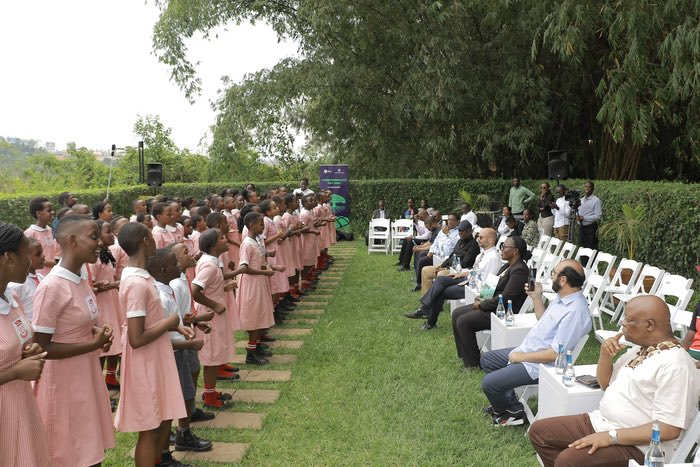
More than 60 primary school students learned about wetland rehabilitation efforts at Nyandungu Eco-Park
Today, Rwanda joined the Commonwealth community in celebrating the Commonwealth Day to honour the unity and diversity within the Commonwealth Nations.
Every year, Commonwealth member countries commemorate Commonwealth Day by observing the celebrations with flag raising ceremonies and cultural events.
Rwanda’s Ministry of Environment Dr Mujawamariya Jeanne d’Arc officiated the celebration of the Commonwealth Day along with Commonwealth countries representatives in Rwanda.
During celebrations at Nyandungu Eco-Park, Minister Mujawamariya Jeanne d’Arc emphasized on youth and global unity in environmental sustainability as a way to enhance resilience for a common future.
Rwanda marked the Commonwealth Day with a session aimed at raising awareness on environmental resilience and marine sustainability.
More than 60 primary school students from Kigali Parents’ School learned about wetland rehabilitation efforts at Nyandungu Eco-Park.
Celebrations at Nyandungu Eco-Park emphasized the vital role of wetlands in our planet’s resilience,with a focus on youth involvement in climate action and conservation.
Rwanda joined the Commonwealth in 2009 becoming its 54th member country. The Commonwealth comprises 56 member states, the majority of which are former colonies of the British Empire.
Commonwealth Day is an annual celebration observed by people all over the Commonwealth Member Countries in Africa, Asia, the Caribbean and Americas, the Pacific and Europe.
The theme for Commonwealth Day 2024, and the forthcoming Commonwealth Heads of Government Meeting, is ‘One Resilient Common Future: Transforming our Common Wealth’.
In a statement, Commonwealth says that the theme highlights how the 56 member countries must harness their strengths by building resilience, unlocking potential, leveraging the ‘Commonwealth Advantage’ and fostering a connected, digital Commonwealth. This transformation is vital to ensure a resilient common future where no one is left behind.
About Nyandungu Eco Park
The rapid growth of Kigali and the associated human activities have put significant pressure on the wetlands. Wetlands, including Nyandungu, have been degraded and this led to biodiversity loss. Encroachment has also resulted in downstream flooding as well as increased pollution due sewage outflows.
In 2016, the Government of Rwanda through the Rwanda Environment Management Authority (REMA) developed the Nyandungu restoration project to respond to these challenges and demonstrate the potential of wetlands to abate pollution and reduce the risk of flooding in urban areas.
Since then, the Rwf 4.5 billion project has restored critical habitats, including a native fig forest and the wetland itself, and rehabilitated streams and ponds to alleviate floods and reed-beds to reduce pollution before turning the wetland into an Eco Park. The 122-hectare park represents the value of restoring urban ecosystems, and serves as a blueprint for other wetlands in the City of Kigali and across Rwanda.
The Nyandungu Eco Park provides a space for residents and visitors to the city to explore and learn from nature, and is part of Rwanda’s efforts to harness eco-tourism to restore biodiversity and conserve urban wetland ecosystems.
The restoration of Nyandungu Wetland to an Eco-Tourism Park serves as an example of Rwanda’s efforts and commitment towards environmental protection, particularly for the restoration and conservation of wetland ecosystems at large, as well as eco-tourism.
Nyandungu Eco Park features a medicinal garden, a Pope’s Garden, five catchment ponds, three recreation ponds, an information centre, a restaurant as well as more than 8km of walkways and bicycle lanes. (End)
